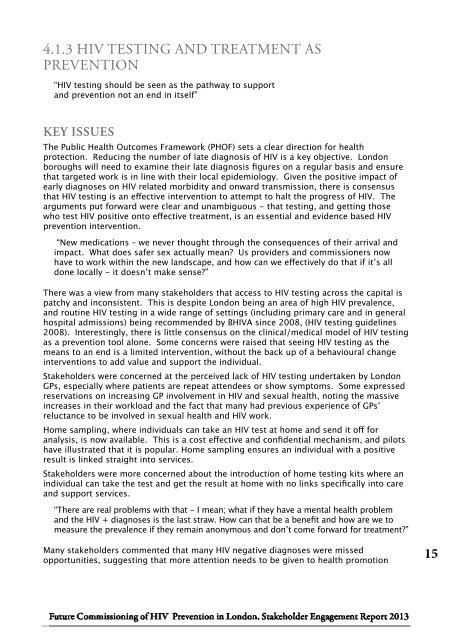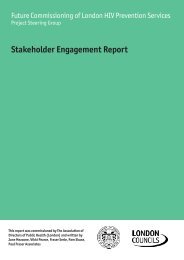Stakeholder Engagement Report - London Councils
Stakeholder Engagement Report - London Councils
Stakeholder Engagement Report - London Councils
You also want an ePaper? Increase the reach of your titles
YUMPU automatically turns print PDFs into web optimized ePapers that Google loves.
4.1.3 HIV testing and Treatment as<br />
prevention<br />
“HIV testing should be seen as the pathway to support<br />
and prevention not an end in itself”<br />
Key Issues<br />
The Public Health Outcomes Framework (PHOF) sets a clear direction for health<br />
protection. Reducing the number of late diagnosis of HIV is a key objective. <strong>London</strong><br />
boroughs will need to examine their late diagnosis figures on a regular basis and ensure<br />
that targeted work is in line with their local epidemiology. Given the positive impact of<br />
early diagnoses on HIV related morbidity and onward transmission, there is consensus<br />
that HIV testing is an effective intervention to attempt to halt the progress of HIV. The<br />
arguments put forward were clear and unambiguous - that testing, and getting those<br />
who test HIV positive onto effective treatment, is an essential and evidence based HIV<br />
prevention intervention.<br />
“New medications – we never thought through the consequences of their arrival and<br />
impact. What does safer sex actually mean? Us providers and commissioners now<br />
have to work within the new landscape, and how can we effectively do that if it’s all<br />
done locally - it doesn’t make sense?”<br />
There was a view from many stakeholders that access to HIV testing across the capital is<br />
patchy and inconsistent. This is despite <strong>London</strong> being an area of high HIV prevalence,<br />
and routine HIV testing in a wide range of settings (including primary care and in general<br />
hospital admissions) being recommended by BHIVA since 2008, (HIV testing guidelines<br />
2008). Interestingly, there is little consensus on the clinical/medical model of HIV testing<br />
as a prevention tool alone. Some concerns were raised that seeing HIV testing as the<br />
means to an end is a limited intervention, without the back up of a behavioural change<br />
interventions to add value and support the individual.<br />
<strong>Stakeholder</strong>s were concerned at the perceived lack of HIV testing undertaken by <strong>London</strong><br />
GPs, especially where patients are repeat attendees or show symptoms. Some expressed<br />
reservations on increasing GP involvement in HIV and sexual health, noting the massive<br />
increases in their workload and the fact that many had previous experience of GPs’<br />
reluctance to be involved in sexual health and HIV work.<br />
Home sampling, where individuals can take an HIV test at home and send it off for<br />
analysis, is now available. This is a cost effective and confidential mechanism, and pilots<br />
have illustrated that it is popular. Home sampling ensures an individual with a positive<br />
result is linked straight into services.<br />
<strong>Stakeholder</strong>s were more concerned about the introduction of home testing kits where an<br />
individual can take the test and get the result at home with no links specifically into care<br />
and support services.<br />
“There are real problems with that - I mean; what if they have a mental health problem<br />
and the HIV + diagnoses is the last straw. How can that be a benefit and how are we to<br />
measure the prevalence if they remain anonymous and don’t come forward for treatment?”<br />
Many stakeholders commented that many HIV negative diagnoses were missed<br />
opportunities, suggesting that more attention needs to be given to health promotion<br />
15




